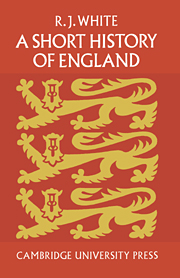Book contents
- Frontmatter
- Preface
- Contents
- Introduction: On the Character of English History
- 1 Roman Britain
- 2 Saxon England
- 3 The Anglo-Norman State
- 4 Common Law and Charter
- 5 The High Middle Ages
- 6 The Nation-State
- 7 The first Elizabethan Age
- 8 The Civil War
- 9 The Withdrawing Roar
- 10 The Century of Success
- 11 The first British Empire
- 12 The Age of Everything
- 13 War and Peace
- 14 Victorian Ages
- 15 Imperial and Edwardian
- Postscript
- Further Reading
- Index
10 - The Century of Success
Published online by Cambridge University Press: 14 November 2009
- Frontmatter
- Preface
- Contents
- Introduction: On the Character of English History
- 1 Roman Britain
- 2 Saxon England
- 3 The Anglo-Norman State
- 4 Common Law and Charter
- 5 The High Middle Ages
- 6 The Nation-State
- 7 The first Elizabethan Age
- 8 The Civil War
- 9 The Withdrawing Roar
- 10 The Century of Success
- 11 The first British Empire
- 12 The Age of Everything
- 13 War and Peace
- 14 Victorian Ages
- 15 Imperial and Edwardian
- Postscript
- Further Reading
- Index
Summary
The English entered the eighteenth century as the successful people, and the century has been justly remembered as ‘the English century’. They seemed, at least until the revolt of the American colonies, to possess the secret of success in government, in arms, in commerce and industry. All the world went to school to England for lessons in how to succeed. Their constitution was supposed to enshrine the secret of reconciling law and liberty, and, although it was reserved for Englishmen of the next century to talk of their form of government in terms of that ‘far-off divine event towards which the whole creation moves’, they were already assured by such influential observers as the Baron de Montesquieu that they were well on the way to it. The dominant philosophy of the age was the offspring of Newton and Locke, and was soon to be christened by Voltaire ‘the English philosophy’, and commended for adoption by all civilized peoples, and more especially the French. Their economy was proclaimed by the vast forest of masts in the Thames and by the handsome houses and equipages of the London merchants. With his country-house and his city opulence the English merchant was the financial equal of any baron. By close study of the Dutch and their financial techniques, the English had stabilized their economy, and their politics, with the foundation in 1694 of the Bank of England.
- Type
- Chapter
- Information
- A Short History of England , pp. 179 - 198Publisher: Cambridge University PressPrint publication year: 1967



